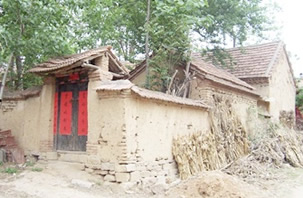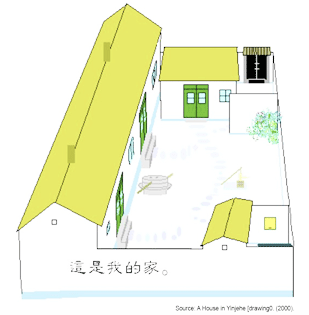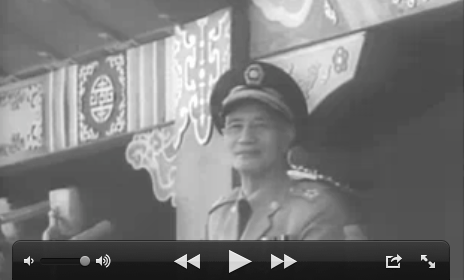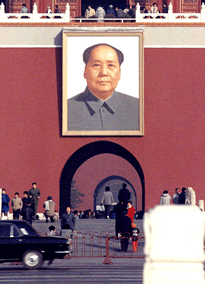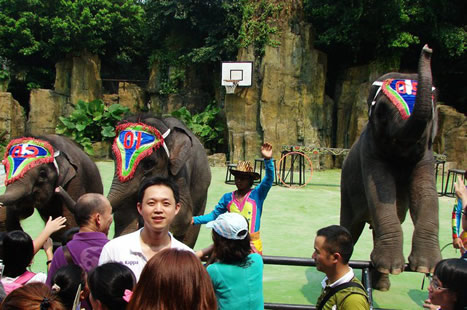global digital divide: from Nigeria and the People's Republic of China
Cynthia L. Selfe, Gail E. Hawisher, Patrick W. Berry, Oladipupo "Dipo" Lashore, and Pengfei Song
Like Dipo's, Pengfei Song's literacy narrative includes encounters with material
constraints and networked possibilities. Click on image for a slideshow of Pengfei since graduation.
-
Home
-
Introduction
-
Chapter 1: Digital Literacies, Technological Diffusion, and Globalization
-
Chapter 2: Digital Media & Transnational Connections: From Sarajevo, Bosnia-Herzegovina, and Sydney, Australia
-
Chapter 3: Cultural Designs for Writing Digitally: From Urbana, Illinois, and Afar
-
Chapter 4: Acts of Translation in the Academy and Across National Boundaries
-
Chapter 5: Global Digital Divide: From Nigeria and the People's Republic of China
-
Conclusion
-
Resources
CHAPTER 5: Pengfei Song
Five years Dipo's senior, Pengfei Song was born on 20 January 1979 on a farm near the small village of Yinjiahe in Shandong province in the People’s Republic of China, at the same point in history that his country established formal diplomatic relations with the United States (1978) and that his country's policy of one child per family was put into effect (1979), and only two years after the first fully assembled microcomputers began rolling off factory production lines in California (1977).
Pengfei describes his birth in terms of family lore and the government’s attempt to control population:
"I was born in my maternal uncle's kitchen because I was not supposed to be born due to the population plan. My mother didn't dare to go to the hospital as she might be forced to do an abortion."
He noted:
"Twenty years ago, when I was a kid, everyone was living in a house like the one in…[this] picture."
A house similar to one Pengfei lived in as a child
"The corn stalks leaning against the wall are for the kitchen fires. I think my house was a lot more beautiful…. My elder sisters needed to go outside to cut grass to feed the rabbits and the pigs, to catch grasshoppers to feed the chicken, to help [with] fertilizing and harvesting the crops and sometimes to help with cooking. We used mostly dry stems of the corn, the soybean, the wheat, to make a fire for the kitchen. Our furnace was made of mud. We had our mill to make flour. Many times, my sisters and my mom would stay up late grinding the corn around the mill."
Pengfei's family, as he described it, lived in a very rural area of China and “had very little money.” As he tells the story:
"Everyone was poor at the time, but we were poorer since my parents had to support both us and my father's younger brothers. I remember when I was a third grade student, we were asked to subscribe to the 'Elementary Student's Newspaper' for like 40 cents a semester. I was the only one who could not do it. I did not actually even ask my parents for the money since I did not want to add even a little bit to their already heavy burden. We lived in a three-bedroom house with a big patio. We had our own well [and] vegetable garden. We had chickens, rabbits, pigs, and quails. The bathroom [was] a hut where the pigs lived. We had lots of trees in the yard. We used the trees to make furniture. We also made food from the leaves of the elm trees and the flowers of the black locust. Most of the time, hand-washed clothes were hanging out on a string to let them dry. [Here] is a picture I made:"
A drawing that Pengfei made of his home in the
village of Yinjiahe in the People’s Republic of China
Pengfei’s parents, while poor, were deeply supportive of their children’s literacy—albeit in very different ways. His mother, Yun Wang, had no formal schooling or instruction in reading and writing, having been born in the same turbulent year that Chiang Kai-shek lost the battle for mainland China and fled to Taiwan, and that Mao Zedong, who proclaimed the People’s Republic of China, became the chair of the Communist party, joined forces with Zhou Enlai, the newly appointed premier, and entered Tibet.
As Pengfei tells his story, we are mindful of the cultural and historical contexts that shape his literacy narrative, which is a select context that emphasizes particular possibilities for meaning and action. In 1949, the year Pengfei's mother was born, China was at the end of its civil war. During this time, few Chinese attended school. "Mao Zedong understood the political importance of control over education, and as part of its development strategy, the Communist Party returned to its pre-civil war aim to improve access to education for all" (Liqing Tao, Margaret Berci, and Wayne He, n.d.).
Chiang Kai-shek, after 12 years in Formosa (Taiwan),
in a "News in Brief" video (Formosa, 1961, October 16), still hoping
for freedom in Mainland China. Click on image to view video <transcript>.
In the images below, we see Mao Zedong's portrait at the Gate of Heavenly Peace, the entrance to the Forbidden City in Beijing, and a 1966 propaganda poster declaring "Chairman Mao is the Red Sun of Our Hearts."
Mao Zedong—Portrait at the Gate of Heavenly Peace (天安门,
the entrance to the Forbidden City in Beijing
Crowds waving the little red book, by Flickr user thaths
Yun Wang's childhood—coincident with Mao’s national collectivist project and China’s Great Leap Forward—left her little time for formal education. These momentous events did not prevent her, however, from sharing her family’s great esteem for both literacy and education. As Pengfei tells her story:
"My mother was born in 1949. When she was ready to go to school, the Land Reform Movement started in China. Because of her paternal uncle being a landlord—[who] was shot to death when my Mum was 5—she was deprived of the right to go to elementary school. When she finally got a chance, she was already 14 years old. She said she went to the class once, and she felt stupid since she was so much taller than her classmates and she decided at the time not to go there again. Indeed, she didn’t go, and she is almost illiterate.
But even if [she had known] how to read, she wouldn't [have been able] to teach the children, since we were so poor at the time and she had to do all the farm work as well as making handicrafts to sell to support her four children and her in-laws. My mother sang to us. She memorized several articles written by Chairman Mao (which [were] made into songs).
My mom…[also told] us…whose son in the village had been admitted by the college, whose daughter was chosen by the best high school, etc. We all admired them and wanted to be good students.
My mother thinks education to be very, very important. She married my father because [he] was then a teacher, teaching my mother's brother and sister. My mother knew that one did not have to do farm work if he or she knew how to read and write. In the Chinese history, it has always been the educated people who ruled. She wanted us to be good students and could be at least a teacher after school.
She could not teach us how to read and write. My father would not teach her, and she was busy. She had been a construction woman, a [dustperson] sweeping the streets, and finally an officer inspecting the city sanitation, but her encouragement and her tears did the thing. She now feels very proud of us since all of us had been excellent students."
Pengfei’s father, Dechang Seng, was born in 1946, a year after the end of World War II, a conflict that saw the death of 20 million Chinese citizens. As Pengfei observed about his father:
"[He was the] first child in his family. He has three brothers and a sister. At the age of 17 when his youngest brother was just born for a few months, his father died due to the poor medication at the time. Although an excellent student in his class, my father decided to quit school and start working to support the whole family. His fame of getting the first prize in a countywide writing contest easily earned him a position in a local high school.
A few years later, he became a news reporter, writing articles for the government. During that time, he published many articles on the national papers, and he even published two of his own books. He is a really smart guy.
But since he broke the policy of the population plan—I was the fourth kid—he had a very hard time getting promoted. He had been working in a city four miles away from where we were living ever since I was born. But since we had no vehicles, we didn’t see each other except on…Sundays.
My father [was] so busy those years that he did not pay much attention to us. But I do remember I was once playing truant and was caught by him. I got a good beat[ing]. It was the only time that my father had beaten me."
While the family lived in the country, Pengfei noted, his education was limited by both circumstances and economic resources. As he explained:
"[N]one of my little buddies went to the kindergarten. Actually I had never seen a playground slide, a seesaw, or a swing until I was 7 years old…. At the age of 5, I had a chance to go to a preschool which we called 'Yu Hong Ban' (literally, it means “class to cultivate the red-army children”). But since we were poor and many other children did not go either, my parents decided that I could wait for another year.
My formal education started in 1985 in a village elementary school. My class teacher herself was a farmer and she taught us Chinese, mathematics, and science. The classroom was made of mud and the student-tables were made of cement. We had to bring our own stools. In wintertime, each of the kids was asked to bring a bundle of firewood, so that we could keep ourselves warm. Though there were not many types of equipment, we still had lots of fun. We used whatever we had (rocks, bones, vegetables) to do experiments to help learn the text. But there were no classes like arts, music, or physical education."
In 1986, however, when Pengfei was 7, his family moved to Linqu City, about six miles away. There, he was able to attend a larger school:
"I started with a new school, which was a lot better. The first thing that surprised me was that the class teacher—Chinese teacher too; usually the Chinese teacher is the class teacher—required us to speak in Mandarin when reading. The second [was] all those classes of art, music, and physical education. I remember the first time when I attended the music class, my teacher asked me to sing a song and I was wondering what a song was. My mother had been singing all the time at home, but I never knew that it was called 'a song' till then."
At home, Pengfei’s reading was limited to his school textbooks and an occasional novel smuggled into the house by his older sister, who was coming of age in a period when 100,000 prodemocracy students and workers protested in Beijing’s Tiananmen Square during Deng Xiaoping’s administration (Scaruffi, 2011):
"[There was] nothing much to read around the house. My father had several books about world literature, but I found them to be very abstract and boring. He also had lots of books written by Karl Marx, Lenin, etc. I hated them too. I read mostly my textbooks. I got more reference books to read as a teenager since my sisters got some. I didn’t even buy my textbooks. I just [used] my sister’s books.
I also read my first novel at this period, How the Steel Was Tempered. One of my sisters was a big fan of martial-art novels—like Crouching Tiger Hidden Dragon. My father hated it and burned all those novels that she borrowed. But How the Steel Was Tempered was not burned."
It was at his new school in Linqu that Pengfei started his study of English, an effort he grew to love:
"In my sixth grade, when I was 12 years old, we started learning English. I did not know almost anything about [it]. I was very fortunate to have a teacher who just graduated from the college and spoke Mandarin during the class. Her pronunciation was perfect; thus I did not get too much bad influence called 'Chinese-accented English.'
My three sisters liked English too. I guess I liked it because my parents do not know anything about it. My father knows some Russian, but very little. He never encouraged me to learn English, but I liked it from the very beginning. On the first test, after we [had] learned all those 26 letters and some words, like 'bee, bed, apple, bag', I got a perfect mark. The teacher did not praise me, but I was proud of myself and loved English more ever since.
During the summer vacation of 1993, my sister borrowed a book called New Concept English from a rich classmate of hers. She liked it very much, but she did not have time to read it before it was the time that she must return it. Thus she asked me to copy the book for her since I had no homework that summer. I agreed and started copying the [entire] book. There were about 300 short English articles and hundreds of new words for me. However, I finally finished it. In that fall I started my senior high school…I noticed…how [much] better my English was than the others. There were more than 700 students in my grade, and I always got the highest score for English.
There was once a national English contest for senior-3 students. My English teacher encouraged me to try, and I got a much higher score than the senior-3 students. However, my English teacher never praised me. In the class, I was always ready to answer her questions, and I guess she was not happy that I did not give the other students a chance. But honestly, I did not realize it. I loved it so much that I thought I was the only student."
Pengfei noted that many of his scholastic achievements were accomplished within a context of extremely strict discipline. As he remembered:
"The teachers in the junior high school would punish the students if [they] talked in the class while the teacher was out. All teachers in the school beat the students. One of my teachers once knocked my classmate's head to a piece of glass on the table. The glass cracked, and my classmate got blood on his head."
When asked if his school was segregated by religion, or race, or gender, Pengfei noted,
“No. The teachers beat the girls almost in the same way as the boys.”
In 1996, the year before Deng Xiaoping died, the English left Hong Kong, and the new Premier Jiang Zemin unveiled a plan to privatize state-owned industries. Given his excellent scores in English, his growing love of Mandarin poetry and literature, his hobbies of broadcasting, painting, and singing, and his success in math and science courses, Pengfei was accepted at Tianjin University, the oldest university in China. At this point in history, China’s economic vigor had begun to show itself, and the country was playing an increasingly active economic role in global marketplaces. In fact, the gross domestic product in China was growing faster—at about 10% a year—than that of any other nation in the world (Scaruffi, 2011).
In looking back on this optimistic time of national growth, Pengfei described his performance in most classes as “average,” although he admitted that he excelled in the study of English. As a Chemical Engineering major, he studied scientific English:
"I started to keep an English diary a week after I entered college, since I was told by a senior student that it would help improve my English. It was hard at the beginning to write [in] it since I felt there was not much to say, but once I [had] been keeping it for a month or so, I could not stop writing. Sometimes I would write [an entry] eight pages long. I checked my old diaries I kept at the time last year when I went back to China, and I found lots of mistakes. But I could tell that my English at the last page was a lot better than that at the first few pages. I kept the diary for two years."
Pengfei also enjoyed practicing his English in conversational settings. A bridge across one of the lakes on the Tianjin University campus had become a meeting place for students who wanted to practice their language skills in a conversation setting, and it became known as “the English bridge.” Pengfei noted that he liked the English bridge because he could converse “in the open area where one can feel the cool breezes,” and added, “I do not like indoor Conversation[al] English.” As he remembered:
"There was an English bridge…at the time on campus every Saturday evening. It was a place that all the English lovers [went to practice] oral English. I [kept] going there until it was banned. If it rained, we would talk in raincoats or under umbrellas. If it was cold, we would put on lots and lots of coat[s] and jump to keep our feet from being numb.
I would talk there with different people until I was the last one…there. [By the] time I went back to the dorm, the janitor of the dorm would have already locked the door. I knocked for a long time, [but] he would not open it. I went back to the building hoping that I could call my roommates out to open the door, but they were fast asleep. I finally found a way to climb onto the second floor, where I lived, through a bathroom window.
The bridge was banned two years after because of an accident that happened there. I had been so angry that I sent a letter to the president of the university. He replied [to] me, but he did not reopen the bridge. I felt empty and could not sit still when Saturday evenings came. I walked on the road, I talked to myself in English…. I was once thought crazy by some of the people, and I was. I started to bother those [overseas] students on our campus. Most of them were from Africa, and their mother tongue [was] not English, but they knew it. It is not allowed for the Chinese students to enter their building, but I found a way to sneak there. I had a friend from Guinea, but he [preferred] to speak Chinese to me. Not long [afterward], I came to know another place that people could practice oral English. It was about 20 minutes['] ride [by] bicycle. I started going there every week till I graduated in 2000."
It was also at Tianjin University that Pengfei first encountered computers:
"I had never seen a computer until I went to college. We were using Apples for freshmen to do some Fortran programming for one of the computer courses. The university thought it necessary for us engineering students to learn a scientific programming language using the computer.
I was 17 then. Freshman. They gave lectures and exams. The computer lab was locked most of the time, and we could not touch the computer when the lab [was] over. We were not allowed to try any new things since they thought we would screw up the computers. [My access was] 2 hours per week when I was a freshman. No access for sophomore year and junior year."
By 1999, Pengfei had begun frequenting Internet cafes in order to complete applications for graduate programs in the United States:
"I started to go to the Internet bars to send e-mails to [the U.S.] because it [was] cheaper and faster than sending out an application through [the] mail…I learned to use Word when I started the U.S. university application [process] in 1999, then for my thesis paper. I used Notepad mostly. I had to learn [myself]. There was no encouragement from anyone. Everyone was learning to use…[computers] at the time."
These same Internet cafes, Pengfei noted, were partially responsible for China’s rapid entrance into the global information society:
"It was not easy before 1998. But now there are Internet bars everywhere. Surfing the Internet is no longer the rich college student’s privilege. There are training classes everywhere to teach you how to use it. All you need to do is to pay them money.
China is developing fast as far as computers are concerned. Now my father has a computer, and we chat on the Internet. One of my sisters has a computer too. The other two sisters are planning to buy one.
Educational and economic factors…made this possible. Everyone knows now that [the] computer is a powerful tool for people of our generation. If you do not know how to use a computer, you are considered almost illiterate and will lose lots of working opportunities."
By 2000, Pengfei had been accepted into a graduate program in biochemistry at Michigan Technological University and had been awarded a teaching assistantship at that institution, becoming one of 547,867 international students and 59,939 Chinese students to study in the U.S that year. (Institute of International Education, 2001).
At the university, Pengfei continued to develop and expand his range of digital literacies. By the spring of 2003, six years after he first saw a computer, he was using these machines to write e-mail to friends, family, professors, and employers; conduct research for his classes; download Chinese folk music and videos and software programs for his research; chat in real time; work on his digital photography; design presentations and advertisements for events; prepare PowerPoint presentations; study Spanish; send Web-camera videos to his parents; make greeting cards; and play computer games. As he described his interests:
"Most of my Chinese friends are computer geeks. They learn programming and everything. One friend knows where to download everything for free from the website. I always ask him when I have a question. He would also tell me what website is not safe to download. My strategy is to ask my friends to go to the chat rooms. I know a freebie website which is really cool."
Pengfei’s family now owns a computer as well:
"My father bought the computer with my eldest sister’s help. My eldest sister’s brother-in-law is the owner of a computer shop and gave my father a good bargain. He bought it a year [ago]. I told him that I could talk to him for free (saving the telephone bills for me.) I could let him see me using a Web camera. [The computer cost] $600. That’s like half a year’s income of my father. My father still only uses the computer for chatting with me and for surfing the Internet. My sister is leaning to use all the office files and other multimedia applications."
As Pengfei observed about his own increased computer use:
"There’s no other choice. You have to do your homework on the computer…. I think the U.S. system is forcing people to learn how to use computers…. I do not know what to do without a computer. I am not going to [know] what is happening in the world without the Internet."
Despite his own accomplishments and his family’s successful entrée into the information society, Pengfei recognized that technology was still far from evenly distributed in his own country:
"Older citizens, people living in the countryside, people [who have] little education and people who work mainly [as laborers] do not have access to computers. Since most programs are English-directed, it is difficult for those people to learn how to use [computers]. Also, they may not realize how powerful the computer is or they simply do not have money to buy one.
Computers are considered to be a luxury by many people. In my opinion, there is almost no sex or race discriminations in China (maybe in [a] very few of the faraway mountain villages, girls are discriminated [against]). But if you are poor, you can't buy a computer. Usually inland people have less access to computers since they are poorer."
Within the larger context of Asia and other parts of the world, then, technology remains unevenly distributed along axes generated and sustained by global and local capitalism. In Pengfei’s China, more particularly, although Internet and computer use expanded rapidly after 1999, older people and those who live in rural areas often have less access to information technologies.
Pengfei at the Changlong Zoo in Guangzhou, China
previous < > CHAPTER 5: What These Literacy Narratives Suggest

